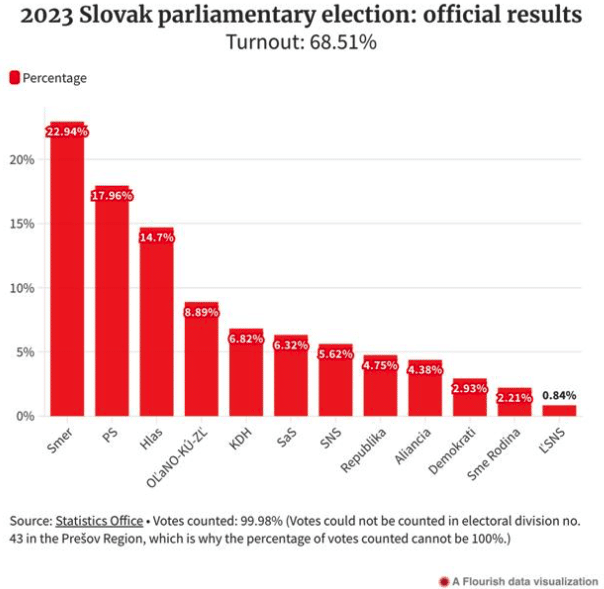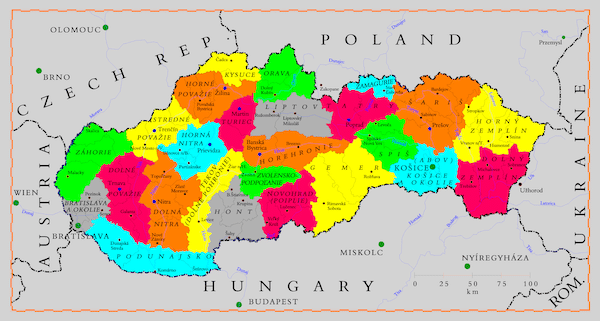The Slovak parliamentary elections [30 September] were won by the anti-war, pro-negotiations party Smer-SD DIRECTION—Slovak Social Democracy led by Robert Fico.
Smer won 22.94% of the votes and 42 seats out of 150 in the Slovak National Council. Robert Fico has been given a mandate by President Zuzana Čaputová to form a governing coalition. The Speaker of the Parliament has declared the results of the election valid.
Smer increased its share of the vote by 4.65% compared to the 2020 election and by 4 seats in parliament.
The victory of Smer marks a rejection of the U.S. project to pull Europe behind its proxy war with Russia. It also refutes the idea that Central and Eastern Europe is a monolithic bloc fully committed to fighting a war against Russia without compromise.
Fico has long made clear his opposition to the war in Ukraine and his desire for peace with Russia. He has promised to stop arms supplies to Ukraine, opposed sanctions against Russia and spoken out against NATO.
Opinion polls in Slovakia reveal that only a minority of voters believe Russia is at fault for the conflict in Ukraine.
A Globsec poll earlier this year ‘noted that 69 per cent of respondents agreed that by providing military equipment to Ukraine, Slovakia was provoking Russia and bringing itself closer to war.’

Source: The Slovak Spectator
In conversations with journalists immediately after the election, Fico said that ‘Slovakia’s foreign policy orientation will not change on his watch’ according to the Slovak Spectator. But it also pointed out that Fico went on to say, ‘Our position remains unchanged,’ insisting that his party will call for immediate peace talks.
Fico
Smer’s win was achieved in the face of a blizzard of denunciations by most Western media. Pro-war outlets like CNN and the New York Times were unanimous in dismissing Smer simply as pro-Russia.
Smer has been a member of the Party of European Socialists (PES) in the European Parliament for over twenty years. This week, Fico has spoken out against a warning from the PES President threatening Smer with expulsion from the group over future actions on the war in Ukraine.
In response, Robert Fico said, “The left is losing almost everywhere in Europe, so the victory of a genuine left-wing party in a parliamentary election in an EU member state should be welcomed.” He added that he thought the PES president’s comments were a “message of blackmail.” Fico concluded,
Either we say what the U.S. wants us to say, or we will be expelled. Either we join and obediently carry out the policy of one single opinion or we become pariahs if we are going to say that the EU should launch a peace initiative in Ukraine, that it is better to stop the killing immediately and negotiate peace for ten years rather than let the Russians and Ukrainians kill one another for ten years without a result. The chairman of the PES has consistently followed the philosophy that whoever is for peace is a warmonger, whoever is for war and killing is a peace activist.
Impact of U.S. policies on Europe
The consequences of the war in Ukraine continue to permeate European politics. War weariness is palpable.
As the New York Times reported, the battle lines have barely shifted since January 2023 with no sign of an end to the stalemate. In the meantime, there have been countless thousands of casualties.
European subordination to the U.S. and its proxy war against Russia war continues to cause massive damage to the people of Europe. The U.S.-led sanctions against Russia have broken previous trade relationships between Europe and Moscow and created a dependence on much more expensive energy from the U.S. and elsewhere.
The continent has also been hit hard by the effects of U.S.-created international inflation and the drain of capital investment from Europe to the United States due to Biden’s Inflation Reduction Act. The consequent cost of living crisis is hitting the working class and the petty bourgeoisie, particularly its poorest and most marginalised parts. In Slovakia, the support for Fico and Smer was much higher outside the capital, Bratislava.
Austerity
Fico’s win follows the collapse of a pro-war, pro-austerity, centre-right government composed of technocrats and civil servants, which came to power in May this year.
The news company POLITICO recently described the Slovakian economy:
Slovakia’s economy today is an also-ran. Its per-capita GDP puts it near the bottom of the euro-area rankings with the likes of Latvia and Croatia. It does top the league tables by one measure–the size of its budget deficit, which is forecast to reach nearly 7 percent this year.
For the moment, the Slovakian election may represent, with its tiny population of 5.4m, a very small crack in the pro-war, pro-U.S. united front, but it could also be understood as the beginning of a much wider divide which is about to grow across Europe.
Smer fought the election primarily on living standards, which were made worse by the effects of the war in Ukraine. It rejects the austerity of recent governments and denounces profiteering. Its policies of economic redistribution resonate in the poorest parts of the country. However, its right-wing positions on immigration, racism, and LGBTQ+ refute the idea that Smer can simply be described as a left-wing party.
For the left to decisively win across Europe, it needs to unite opposition to austerity and war and complete opposition to racism, sexism, national chauvinism and all forms of bigotry. That is the only way the working class can be united and win a majority in society.

